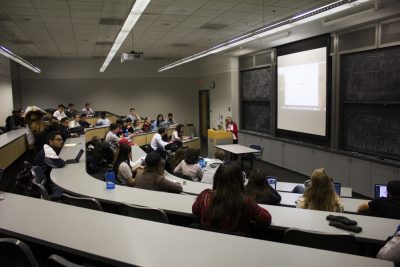
At the beginning of each academic year, the Boston University Student Government is allocated a lump sum of money — around $50,000 — with the objective of distributing the money to improve the student community. Student groups and college-specific senators within SG propose their funding requests to other senators, who vote on whether or not to grant funding.
SG receives its budget from BU’s Student Activities Office, which oversees funding of all student groups, and can then distribute that money as it wishes, according to Nehemiah Dureus, a third-term senator in the College of Engineering.
Senators and members of the executive board may have different interpretations of the purpose of SG’s budget, said Bernie Lai, SG’s vice president of finance.
“I don’t think allocation is the right term for what we’re supposed to do with that money … A senator will obviously say it’s all about allocation,” Lai said. “From my standpoint, along with [that of] e-board, what we do with our budget is use it to advocate for students and give back.”
Casey Khan, a freshman senator in the College of Communication, said that while SAO does fund certain groups, SG focuses their efforts on the student body as a collective.
“We allocate money when we think it will benefit everybody,” she said.
When money is involved, speculations can arise about the fairness of the allocation process. However, Dureus said SG does keep the well-being of the BU student body in mind when making decisions.
“When a proposal comes to senate, we discuss it a lot,” Dureus said. “If it doesn’t help the BU community, there’s a small chance that it will pass … The standards are relatively high, so [the proposal] has to have good support.”
Lai said SG is funded primarily by the $551 in undergraduate student fees each incoming freshman pays, which SAO manages.
Paola Poventud, a freshman in COM, said that while many students know that events are partially funded by the undergraduate student fee, the specifics are unclear.
On many billboards and flyers posted throughout campus, the ‘Partially funded by your undergraduate student fee’ tagline floats along the bottom, but few BU students read into the implications of that disclaimer, Poventud said.
“We’re all students here, so we should know where that money is coming from and where it’s going,” she said.
Poventud said she believes more dialogue about SG will help students realize how resourceful the organization is for a diverse and active student body.
Matthew Segalla, a freshman in the College of Arts and Sciences, said he thinks most students are not aware that SG is responsible for funding student groups.
“I feel like SG isn’t promoted enough [and] that people don’t realize it’s a thing at this school,” Segalla said. “If someone mentions SG, students don’t realize that that’s a college-level organization. It’s just not made clear.”
Dureus said he thinks many students do not understand the distinction between SAO and SG.
Tiffany Xue, a junior in ENG, said she thought all student activity funds come directly from SAO.
“I didn’t know that SG has their own funding, so I find it pretty interesting that SG provides allocation for student groups,” Xue said.
Khan said that the SG is working on getting the word out about their role within the student community.
“We’ve been trying to fund more student activities, because we’re not well known,” Khan said, referring to the $7,000 SG recently allocated for ENG’s BU Spring Carnival.
Dureus said he thinks transparency is important in allowing students to understand how SG allocates money. BU politics are like real-life politics, Dureus said — if citizens are not engaged, they might not be getting the most from the democratic processes around them.
“Transparency is the big thing,” Dureus said. “Everybody needs to know what’s happening in student government.”













